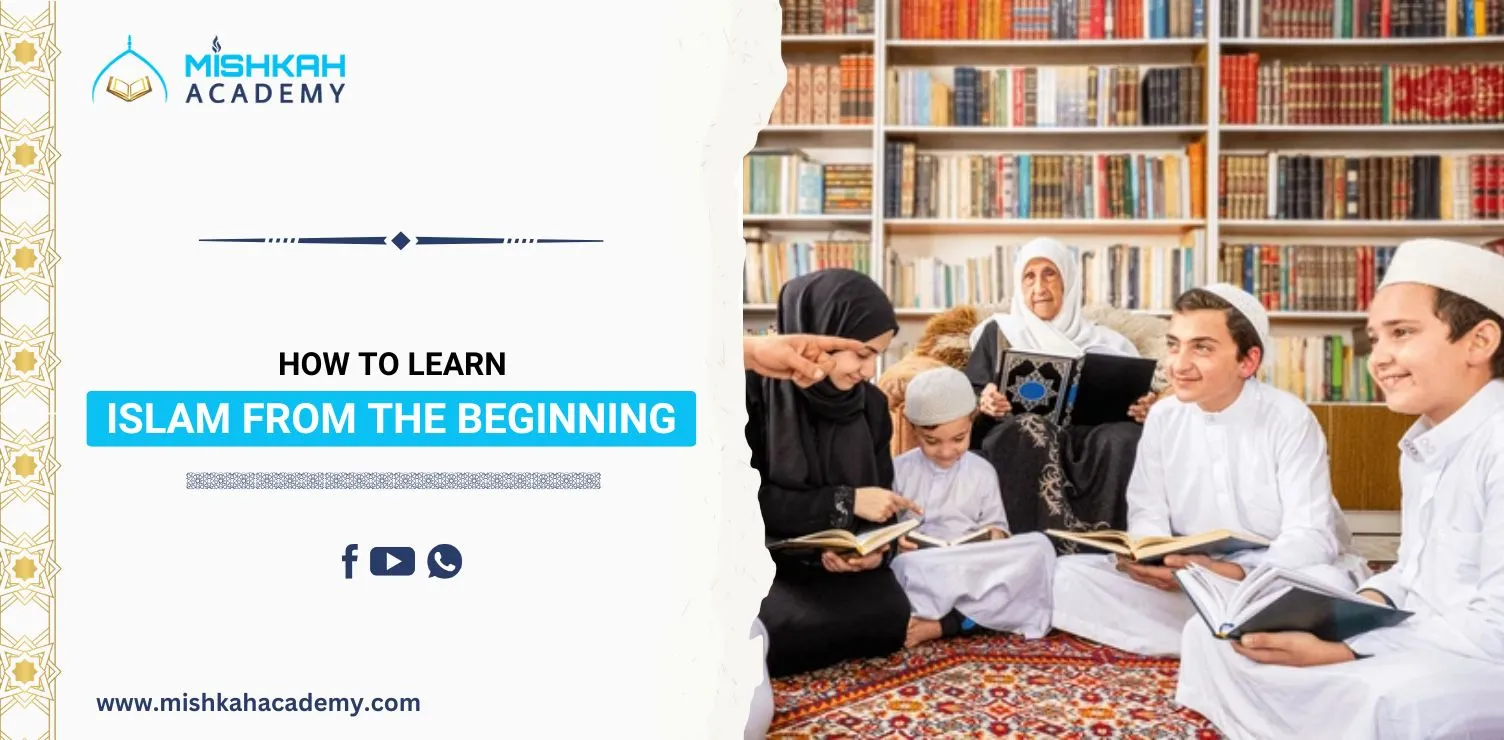It is crucial to have the right guidance when setting out to learn Islam from the beginning. A structured approach can help you understand the essential beliefs, practices, and values of Islam. From studying Islamic history, Arkan Al Iman and the Five Pillars to exploring the Quran with translation, each step is designed to build your foundational knowledge.
We also cover the role of the Prophet Muhammad’s (PBUH) teachings, the significance of faith in “One God,” and the importance of gaining insight from respected scholars.
12 Steps to Learn Islam from the Beginning
Table of Contents
ToggleWith these 12 steps, you’ll gain the knowledge and clarity needed to embrace Islam with purpose and depth. These 12 steps provide new Muslims proper guidance as they can learn all but this in new Muslim course as well.
Step 1. Read About Islamic History
To truly understand Islam, start with its history. Learning about how Islam began and spread will give you a strong foundation. Recommended sources include books like:
- “Muhammad: His Life Based on the Earliest Sources” by Martin Lings
- “In the Footsteps of the Prophet” by Tariq Ramadan
- “No god but God“ by Reza Aslan.
These books offer clear explanations about the Prophet Muhammad’s (PBUH) life, the challenges early Muslims faced, and the growth of the faith. Knowing this background helps you see the context of Islamic teachings and appreciate how they developed. Studying Islamic history connects you to the origins of the faith, making each lesson more meaningful.
Step 2. Embrace the Five Pillars of Islam
The Five Pillars of Islam are the core practices every Muslim follows. Each one strengthens a different aspect of faith. Here’s a brief look at each:
- Shahada (Faith): Declaring faith in Allah and the Prophet Muhammad (PBUH) builds the foundation of belief.
- Salah (Prayer): Performing five daily prayers connects you to Allah regularly.
- Zakat (Charity): Giving a portion of your income to those in need promotes generosity and social equality.
- Sawm (Fasting): Fasting during Ramadan teaches self-discipline and empathy for the less fortunate.
- Hajj (Pilgrimage): Visiting Mecca at least once, if able, brings unity among Muslims worldwide.
Step 3. Know the 6 Articles of Faith
The Six Articles of Faith outline the key beliefs in Islam, essential for anyone starting to learn about the religion. Here’s a simple table to explain each belief and its significance:
| Article of Faith | Description | Importance for Beginners |
| Belief in Allah | Believing in one God | Forms the core of Islamic monotheism |
| Belief in Angels | Accepting the existence of angels | Shows Allah’s guidance and protection |
| Belief in Holy Books | Recognizing scriptures like the Quran | Emphasizes guidance through revealed words |
| Belief in Prophets | Accepting prophets sent by Allah | Highlights the chain of messengers, with Muhammad (PBUH) as the final prophet |
| Belief in the Day of Judgment | Accountability in the hereafter | Encourages living a responsible and moral life |
| Belief in Divine Decree (Qadar) | Accepting Allah’s control over all things | Teaches trust in Allah’s wisdom |
Step 4. Thoroughly Understand the Concept of “One God” in Islam
The belief in “One God” (Tawheed) is the foundation of Islam. The First Kalima, or declaration of faith, expresses this belief: “La ilaha illallah, Muhammadur Rasoolullah” (لَا إِلٰهَ إِلَّا اللهُ مُحَمَّدٌ رَسُوْلُ اللهِ), which means, “There is no god but Allah, and Muhammad is the Messenger of Allah.” This statement affirms that worship is for Allah alone, without any partners.
Prophet Muhammad (PBUH) said,
“Whoever dies while declaring that there is no god but Allah, will enter Paradise” (Sahih Muslim).
Step 5. Read the Quran with Translation and Context
Reading the Quran with translation helps beginners understand Allah’s words directly. The Quran is Islam’s primary source of guidance, covering every aspect of life. Reliable translations, like those from Abdullah Yusuf Ali or Saheeh International, clarify each verse’s meaning.
For deeper understanding, resources like “Tafsir Ibn Kathir“ provide context, explaining why and when verses were revealed. This context, known as Asbab al-Nuzul, helps readers relate teachings to real-life scenarios. Starting with smaller chapters or verses on mercy and patience can be helpful.
Start Your Islam Learning Journey NowStep 6. Deeply Study Uswa-e-Husna, Hadith, and Sunnah
Uswa-e-Husna means the “beautiful example” of Prophet Muhammad (PBUH), a role model for all Muslims. Studying his Hadith (sayings) and Sunnah (practices) reveals his guidance on various aspects of life, from kindness to prayer. The Hadith collections of Sahih Bukhari and Sahih Muslim are well-known sources for beginners.
The Prophet’s life demonstrates the practical application of Quranic teachings. Following his Sunnah shows how he handled challenges, family matters, and community issues. Understanding Uswa-e-Husna and his teachings allows Muslims to implement Islam in daily life
Step 7. Listen to Experienced Sheikhs for Interpretations
Listening to knowledgeable Sheikhs helps beginners grasp Islamic concepts with clarity and context. Some respected Sheikhs include:
- Mufti Menk
- Yasir Qadhi
- Omar Suleiman
- Nouman Ali Khan
Each offers insights on Quranic verses, prophetic teachings, and Islamic values. Their lectures simplify complex topics, making them easier to understand. Their interpretation helps learners avoid misunderstandings and gain a balanced view of Islam. Beginner-friendly platforms like YouTube, AlMaghrib Institute, and Bayyinah TV offer their lectures.
Step 8. Memorize Key Quranic Verses and Duas
Memorizing essential verses and duas (supplications) helps beginners connect with Allah daily. These short phrases bring comfort and remind believers of Allah’s mercy and guidance. Some simple yet powerful duas from the Quran include:
- “Rabbana atina fid-dunya hasanatan wa fil-akhirati hasanatan wa qina azaban-nar” (رَبَّنَا آتِنَا فِي الدُّنْيَا حَسَنَةً وَفِي الْآخِرَةِ حَسَنَةً وَقِنَا عَذَابَ النَّارِ) – “Our Lord, give us in this world that which is good and in the Hereafter that which is good and protect us from the punishment of the Fire” (Surah Al-Baqarah, 2:201).
- “Rabbishrah li sadri” (رَبِّ اشْرَحْ لِي صَدْرِي) – “My Lord, expand for me my chest” (Surah Ta-Ha, 20:25).
- “Hasbunallahu wa ni’mal wakeel” (حَسْبُنَا اللَّهُ وَنِعْمَ الْوَكِيلُ) – “Sufficient for us is Allah, and He is the best Disposer of affairs” (Surah Al-Imran, 3:173).
These duas make faith personal and provide spiritual comfort in daily life.
Step 9. Use a Dedicated App to Learn Little Things About Islam Daily
Using an Islamic app brings daily reminders and learning right to your phone, making it easy to pick up new knowledge. Apps like:
- Muslim Pro
- Quran Companion
Muslim Pro also provides an easy-to-use digital Quran, while Quran Companion helps you memorize verses with guidance. Ummah has community features for Q&A and support from other Muslims. Each app provides bite-sized lessons that help beginners stay consistent in learning.
Step 10. Be Well-informed About the Misconceptions and Myths Related to Isam
Learning about common misconceptions about Islam is important for understanding its true message. Myths and misunderstandings can lead to confusion or bias. Here’s a simple table addressing some common misconceptions and their corrections:
| Misconception | Truth (with Reference) |
| Islam promotes violence | Islam advocates peace; killing an innocent person is like killing all of humanity (Quran 5:32). |
| Women are oppressed in Islam | Islam grants rights and respect to women, encouraging education and independence. |
| Jihad means “holy war” | Jihad means striving for good; it includes personal struggles and self-improvement. |
| Muslims worship Muhammad (PBUH) | Muslims worship Allah alone; Muhammad (PBUH) is His messenger, not an object of worship. |
Step 11. Ask Elder Family Members About Islamic Queries
Seeking knowledge from elders has been a tradition in Muslim families. Older family members, who may have spent years studying Islam, often provide valuable insights and practical wisdom.
Talking to them can help you understand complex aspects of faith, answer questions, and even learn about personal experiences in practicing Islam. This method also builds a strong bond between generations, as elders feel honored to pass on their knowledge.
Step 12. Take Part in an Islamic Studies Course for Ultimate Learning
Enrolling in an Islamic studies course offers structured learning, providing both beginner and advanced knowledge of Islam. Such courses typically include:
- Understanding the Quran’s structure and major themes
- Deep dive into Hadith, Sunnah, and Fiqh (Islamic jurisprudence)
- Lessons on Islamic history and cultural practices
- Guidance on how to perform prayers, fasting, and other essential practices
- Interactive Q&A sessions with knowledgeable instructors
What is the First Step to Becoming Islam?
The first step to embracing Islam is saying the Shahada—a declaration of faith that affirms belief in one God and acknowledges Muhammad (PBUH) as His final messenger. The Shahada states: “La ilaha illa Allah, Muhammadur rasoolu Allah,” meaning “There is no true god but Allah, and Muhammad is the Messenger of Allah.”
Saying this with sincere belief marks the beginning of one’s journey as a Muslim. It signifies a commitment to worship Allah alone, rejecting all other forms of worship.
Where to Start If I Want to Learn About Islam?
To begin learning about Islam, start with the Quran and Hadith, as they provide the core teachings and principles of the faith. The Quran, regarded as the word of Allah, guides Muslims in belief, worship, and daily life. The Hadith records the sayings and actions of Prophet Muhammad (PBUH), giving deeper insights into Islamic practices and ethics.
Visiting an Islamic center or mosque can also be helpful, Same as joining online Islamic classes, study groups, and knowledgeable people to answer questions. Additionally, well-regarded books and reliable online resources provide structured learning for beginners.
Mishkah Academy stands as a leader in Islamic education, guiding learners with expertise and dedication. With experienced quran tutors who have taught for years, Mishkah offers a supportive environment to understand Islam from its foundations by offering special Islamic classes for kids and Islamic classes for adults. Their structured courses, enriched with insights from seasoned scholars, ensure that students gain a deep, authentic understanding of Islamic teachings.
Start Your Islam Learning Journey Now





